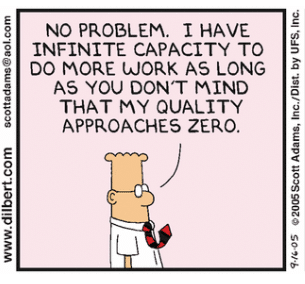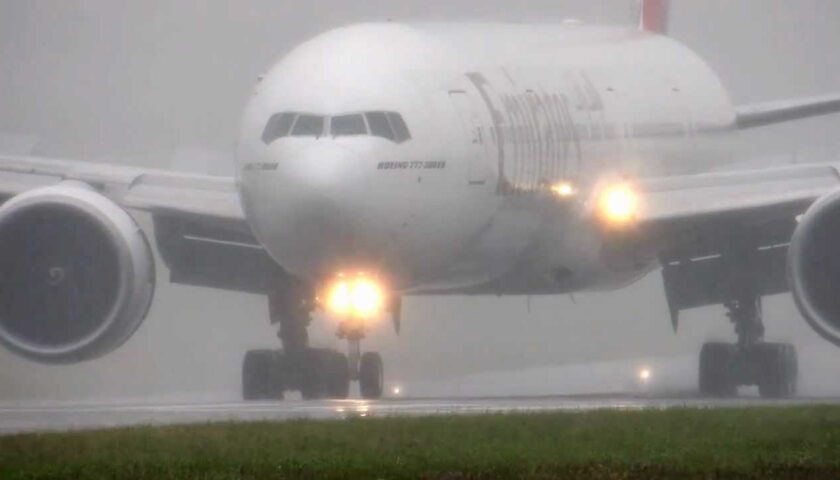If you had been following my blog, you would acknowledge that I take pride in my job and like being considered a professional and meticulous. A few weeks ago, I was assigned four sectors to operate and things were progressing well, I mean as planned. We were ahead of time and weather was holding. This was last sector and it seemed that I would be able to finish before time and reach home early. Expectation and supposition unearthed a ‘chink in my armour’. There was a delay on ground due to unforeseen circumstances. Time continued to click and we were now behind schedule. In order to at-least make good ETD, I ended up being rushed and hurried. This easily broke safety chain and created a situation on ground which could have been disastrous. I was lucky that nothing untoward happened.
Time Pressure
Any pressure we feel can lead to stress and stress can lead to human error. Current practice of turn-around times increases efficiency and value to airline operations and give a sense of time consciousness to operational, maintenance and support staff. However, having a standard fixed time creates a challenge when things do not go as planned as in case of technical defects, weather, changes in load or passenger count. Though it is team effort but every department tries to avoid direct blame for delay. In other word there is underlying pressure to avoid delays.
There are essentially two types of pressure: actual pressure and self-imposed pressure. The first of course is real pressure, applied directly or indirectly, for the task to be completed in a given time. On the other hand, individuals or teams may feel self-imposed pressure to complete a task within a given time, even when it is not advisable or feasible.
The definition of self-imposed is something that you require or expect of yourself, rather than something required by another so our way of dealing with self-imposed time pressure is somewhat different to how we can deal with external time pressure for example for commercial reasons.
For an individual, the self-imposed pressure is real. For them, it is no different from any actual pressure being applied to the completion of the task. All pressure (self-imposed or otherwise) will affect the performance of those subjected to it.

TO RUSH IS HUMAN
Let us look at the data. In a study conducted by Flight Safety Foundation, revealed some good pointers.
- Each hurry up incident had a point where the time pressure error began.
- 63% of the incidents had their origin in the pre-flight phase.
- The taxi-out phase accounted for 27% cases, while all other operational phases combined amounted to less than 10% of all incidents.
- While the roots of time pressure were in a given phase but the events (incidents/accidents) did not manifest immediately.
- While the most time-pressure related error occurred in pre-flight phase, events occurred in take-off phase (33%) and during taxi-out phase (22%).
- When it comes to attributing the error to person(s) in flight deck, the data revealed that 69% error was collective responsibility, 27% – the captain (PIC), and 4% other crew member.
- Data further gave away that, 60% were errors of commission ( taks accomplished incorrectly or done when not required) and 38% were error of omission (task not completed).
The Reason
Initially, it looks unrealistic that flight crew should make more error on ground when doing routine tasks like Pre-flight or Taxi-out activity. I expected that errors should be more common during critical phase of flight like take-off and landing.
Most flight phases employ well defined and designed standard procedure that tend to be linear in time and space – meaning a given task is followed by another required task. For example, at the beginning of take-off roll, the application of power is followed by check of engine parameters followed by performance check. In contrast the duties in pre-flight phase are not linear and often faces interruptions and disruptions. At pre-flight stage, Flight crew deal with plethora of information and activities like FMS planning, weather check and analysis, performance calculation, fuel planning, Load and Trim, MEL items and time pressure. These tasks do not have sequence or priority. The events outside the cockpit (ATC, cabin crew, dispatch, maintenance personnel) also add to factors in time pressure. Publication of On-Time performance figures by national regulation also adds up directly and exerts pressure to keep On-Time performance.
MITIGATING STEP…
Rushing through a task often is cited as an early link in the accident chain, a controllable factor that causes checklists to be missed, briefings to be brushed over and errors to occur. Obviously there is a schedule to keep, which creates inherent pressure to get moving. If there is nothing out of the ordinary such as a maintenance issue, weather or late boarding, then it is easy to be ready to go when the time comes. The reality is, sometimes we do need to rush.
I still remember doing Operational Readiness Platform (ORP) duty in military, when we were required to get airborne in shortest possible time. The aircraft were kept in required readiness state with special cockpit preparation. If mission was not airborne in stipulated time, the hell used to break loose and rightly so. But back then security and mission was of paramount importance.
In commercial aviation, safety is first and foremost. So what is the solution. I always plan to get some extra time. Because gone are the days when Captain (PIC) used to say ‘put the delay on me’ because pilots were never forced to answer to management if delay occurs. But how do I get some extra time? Simply, arriving at the dispatch early, reporting at the aircraft earlier. When things do not go as planned, I look for ways to delegate and I take a leadership role to manage situation. This forces me to evaluate the situation, communicate to team members and bring everyone to same level of alertness and awareness. Ultimately the responsibility remains of Captain while the tasks are delegated. It has worked for me. I am sure many of you would have better solutions/suggestion. I am listening. Thanks in advance.
Be punctual. Be safe.



